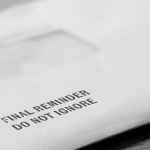Summary
- Money claims in England and Wales were up 28% (to 438,000 claims) in April to June 2025 compared to the same quarter in 2024.
- The CCJ debt recovery process requires pre-action protocols, including Letters of Claim, before court applications.
- Court fees range from £35 for claims under £300 to £10,000 for claims over £200,000, recoverable from the debtor if successful.
- Obtaining a CCJ doesn’t guarantee payment; enforcement through bailiffs, High Court Officers, or other methods requires additional applications and fees.
- The entire process from initial claim to successful enforcement typically takes three to six months for undefended cases, longer if contested.
The invoice sat unpaid for 120 days. Phone calls went unreturned, emails ignored, promises broken. Eventually, Sarah, who runs a Manchester design agency, filed for a County Court Judgment (CCJ) against her client. Six weeks later, she had her judgment. Three months after that, High Court Enforcement Officers collected the full amount plus costs. Total recovered: £8,400 on a £7,000 debt.
County Court Judgments work, but only if you understand the process, timing, and costs involved. With money claims up 28% (to 438,000 claims) in April to June 2025 compared to the same quarter in 2024, more SMEs are discovering that formal legal action often succeeds where informal pressure fails.
When to Escalate to a County Court Judgment
The decision to pursue a CCJ isn’t taken lightly. Court action costs money, takes time, and can signal the end of any cooperative relationship with your debtor. However, certain circumstances make escalation necessary and worthwhile.
First, exhaust informal collection attempts. Send reminders, make calls, and offer payment plans. Document everything; you’ll need evidence that you tried to resolve matters without court involvement. The pre-action protocol for debt claims requires some creditors to attempt agreement before filing. Skip this step, and courts may penalise you on costs.
Consider CCJ action when the debtor stops responding entirely, makes promises they repeatedly break, or disputes the debt without legitimate grounds. If 90 days pass without payment or meaningful engagement, formal action becomes appropriate for debts over £500. Below that threshold, the cost-benefit calculation often doesn’t favour court proceedings unless the principle matters more than the money.
The debtor’s financial position matters enormously. A CCJ against someone with no assets, income, or prospect of either wastes your money. Before filing, research the debtor. Do they own property? Run a business? Have regular employment? Companies House and Land Registry searches can reveal whether pursuing judgment makes commercial sense.
The CCJ Debt Recovery Process Step-by-Step
Understanding how to get a CCJ against a debtor requires following a structured process. Miss steps and courts may dismiss your claim or refuse to award costs.
Step One: Letter of Claim
Send a formal Letter Before Action (also known as a Letter of Claim when sent pursuant to the Pre-action Protocol for Debt Claims) giving the debtor 30 days to respond. This letter must specify the debt amount, how it arose, any interest claimed under contract or statute, and a clear deadline for payment. Include copies of invoices, contracts, or other evidence supporting your claim. The debtor must receive a genuine opportunity to settle before you proceed.
Step Two: Issue the Claim
If the Letter of Claim produces no response or the debtor refuses to pay, issue your claim through the County Court. The Debt-Claims Solicitors portal can do this for you. We also ensure all correspondence and filing is checked before it is sent to the debtor.
Step Three: Service and Response Period
The court serves your claim on the debtor, who then has 14 days to respond. They can admit the claim, defend it, or acknowledge service whilst preparing a defence. If they admit the debt, they’ll complete a financial statement proposing payment terms. You can accept their offer or ask the court to determine appropriate instalments.
Step Four: Default or Defended Judgment
If the debtor doesn’t respond within 14 days, you can request judgment in default. This is straightforward; the court simply accepts your claim as proven and issues judgment for the amount claimed plus interest and costs. No hearing required.
If the debtor defends the claim, the case proceeds to allocation, where the court determines which track applies. Defended cases require more time, potentially a hearing, and legal representation for significant amounts. Many debtors file defences lacking merit simply to delay judgment. Our expert Debt Recovery Solicitors can spot these types of tactics quickly and will swiftly show the court that there is no merit to the arguments put forth.
Step Five: Obtaining Judgment
Once judgment is entered, you receive a County Court Judgment stating the amount the debtor must pay. This typically includes your original debt, court fees, interest, and fixed costs for debt recovery.
The judgment is registered at the Register of Judgments, Orders and Fines and appears on the debtor’s credit file for six years unless paid within 30 days. This credit damage often motivates payment; debtors who ignored invoices suddenly find funds when their mortgage application is refused.
What Happens After You Win Your CCJ
Obtaining the judgment is halfway; collecting the money is the rest. Many creditors discover that a judgment in hand doesn’t mean cash in the bank.
Some debtors pay immediately once judgment is entered. The credit file damage and formal court order concentrate minds wonderfully. You can give debtors seven days to pay voluntarily before enforcing, if you want.
If they don’t pay, you must take enforcement action. The court won’t enforce judgments automatically; you initiate enforcement and pay the associated fees. Our team will help you get the enforcement process underway.
Wrapping up
Sarah’s experience illustrates the ideal outcome: full recovery plus costs within three months. Not every case proceeds so smoothly, but businesses that understand the process and enforce judgments systematically collect substantially more debt than those who only chase informally.
Your unpaid invoice doesn’t have to stay unpaid. County Court Judgments exist precisely to provide SMEs with accessible, affordable debt recovery mechanisms.
FAQs
How long does it take to get a County Court Judgment from start to finish?
For undefended cases, expect three to four weeks from issuing the claim to obtaining judgment. The debtor has 14 days to respond after service; if they don’t, you can request default judgment within days. Add enforcement time if the debtor doesn’t pay voluntarily; bailiff action typically takes four to eight weeks. Total timeline from claim to payment: three to six months for straightforward cases. Defended cases take substantially longer, potentially six to twelve months, depending on complexity and court listing times.
Can I still pursue a CCJ for debts that are several years old?
Yes, the limitation period for debt claims is six years from when the debt became due. You can pursue CCJs for old debts within this period, though you may need to explain to the court why you delayed. Debtors sometimes argue that delay means you abandoned the debt, but legitimate explanations usually satisfy judges..
What happens if the debtor has no money or assets to pay the CCJ?
The judgment remains appears on the register for six years and can be enforced at any time once the debtor’s circumstances improve. However, after six years, you may need to justify why you delayed to enforce it. You can also apply for charging orders against property they acquire later. However, if the debtor is genuinely insolvent with no prospect of recovery, your judgment may be uncollectible despite being legally valid. This is why researching the debtor’s means before filing is crucial; a CCJ against someone with nothing yields nothing except wasted costs.
Can the debtor avoid paying a CCJ by ignoring it or filing for bankruptcy?
Ignoring a CCJ doesn’t make it disappear; it remains enforceable and damages their credit file for six years. However, debtors can file for bankruptcy or liquidation, which may prevent you from recovering the full amount. In bankruptcy, you become an unsecured creditor sharing whatever assets exist with other creditors, often receiving pence in the pound. This risk is another reason to research the debtor’s financial position before pursuing judgment and to enforce quickly once judgment is obtained.


